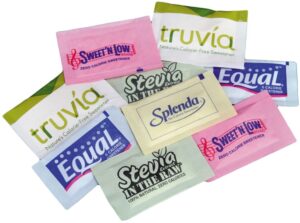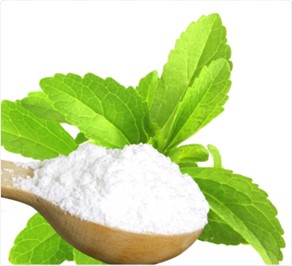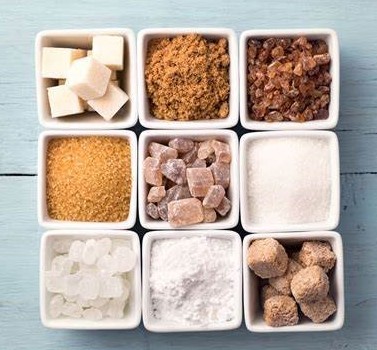Aspartame and saccharin and sucralose, oh my! With so many “zero sugar” options marketed as healthier options, what’s a person to do?!
First things first. Portion control and moderation. Too much sugar isn’t good, nor is too much sugar substitute. And as always, get at least 64 ounces of water in daily! Now, back to our regularly scheduled programming.
What is a sugar substitute? Also known as artificial sweeteners, they taste sweet like sugar, but have less or no calories.
Why sugar substitutes? Added sugar is empty calories. These calories add up and may cause weight gain, as well as increase your risk of health issues such as diabetes and heart disease. Sugar subs step in to maintain sweetness and flavor, but reduce the added calories.
How are sugar subs used? Many replace sugar in foods, candies, baked goods, and beverages. Companies are then able to market the product as “sugar free,” “diet,” or “zero sugar”.
What are the names I’m looking for? The following products are FDA-approved for use in the US:
- Acesulfame potassium (Sweet One, Sunett)
- Advantame
- Aspartame (NutraSweet, Equal)
- Neotame (Newtame)
- Saccharin (Sweet’N Low)
- Sucralose (Splenda)
- Luo han guo (Monk Fruit in the Raw)
- Purified stevia leaf extracts (Truvia, PureVia, others)
- Sorbitol, xylitol (sugar alcohols)

So are they safe or not? As with anything, within moderation. It’s not a cut-and-dry answer because it depends on the height and weight of the person, as well as which sugar substitute you’re using, as to what the recommended daily intake is per person.
Here’s a recommendation from the Texas A&M Agrilife Extension Sugar Alternatives (tamu.edu):
*ADI – Acceptable Daily Intake
There are also some exceptions – people who shouldn’t use sugar substitutes. Patients with phenylketonuria should not use aspartame. While this disease doesn’t affect many people, bowel diseases do. Patients with bowel diseases such as Crohn’s, ulcerative colitis, and inflammatory bowel disease could experience a flare in symptoms when consuming sugar substitutes.
Is there a better sugar sub to use? Most of the dietitians we’ve talked to, and most research online, says to use Stevia or a combination of sugar + Stevia. It is not safe to sub Stevia for everything, all the time. If you have to use sugar subs, Stevia appears to be your best option because it is plant-based, whereas the artificial options are not digested, which is often what causes GI symptoms.

What is the role of sugar substitutes in diabetes management? Again, moderation. Nothing is good in excess! (No, nothing.) Here’s what the American Diabetes Association 2023 Standards of Care:
For some people with diabetes who are accustomed to regularly consuming sugar-sweetened products, nonnutritive sweeteners (containing few or no calories) may be an acceptable substitute for nutritive sweeteners (those containing calories, such as sugar, honey, and agave syrup) when consumed in moderation. Nonnutritive sweeteners do not appear to have a significant effect on glycemic management, and they can reduce overall calorie and carbohydrate intake as long as individuals are not compensating with additional calories from other food sources. … The addition of nonnutritive sweeteners to diets poses no benefit for weight loss or reduced weight gain without energy restriction. 5. Facilitating Positive Health Behaviors and Well-being to Improve Health Outcomes: Standards of Care in Diabetes—2023 | Diabetes Care | American Diabetes Association (diabetesjournals.org)
What is the stance of Southside Diabetes on the topic of sugar substitutes? Moderation! We get it – no one wants to drink plain water all day long. A world without Coke Zero is no world for Dr. Stallings, but she strives to drink a 24oz bottle of water before lunch, which is when she is most likely to have a 16oz can of Coke Zero – but she doesn’t have a Coke Zero daily. Therefore, sugar subs are not meant to be a sub for all beverages, all day, every day. Moderation.
Health benefits can include reduced tooth decay and cavities, reduced spikes in blood sugar, and short-term weight management. Health concerns are mostly with long-term use: higher risk of stroke, heart disease, death, and gut problems. The studies linking sugar substitutes with a higher risk of cancer are from the ‘70s and have since been debunked. (Info from the Mayo Clinic)
In the end, save sugar substitutes for occasional use. The same as you wouldn’t overdose on sugar, the same is true of sugar subs.

